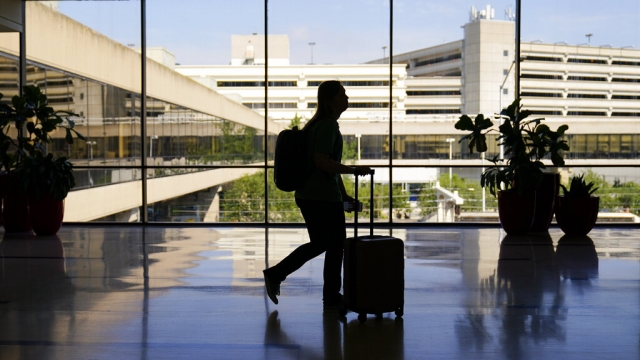"Skiplagging," the growing travel trend dividing airlines and their customers.
Fed up with skyrocketing ticket prices and limited flight options, travelers are tapping into this hack, also known as hidden city ticketing, that allows them to get to their final destination for cheaper. Rather than book a pricey direct flight, travelers are using platforms like skiplagged.com to find less expensive travel paths with layovers at their intended final destination.
Here's how it works: Say you are in Los Angeles and want to get to St. Louis. Rather than pay for an expensive direct flight, you could book a cheaper flight from Los Angeles to New York that has a layover in St. Louis. Then, instead of getting on that connecting flight to New York, you simply stay put in St. Louis.
"Travelers should be able to purchase point A to point B tickets and use it as they see fit," Dan Gellert, Chief Operating Officer of skiplagged.com, said.
Dan Gellert is the Chief Operating Officer at skiplagged.com. He says since its launch in 2013, the platform has rapidly grown in popularity, especially post-COVID-19 as more Americans look to travel.
"Over the past couple of years, as airfares have continued to get higher and higher, with the airlines blaming everything from shortages of workers to inflation to now whatever they're saying now that both of those things are gone," Gellert said. "But airfares are still, you know, ridiculously high, and skiplagged.com has become even more of a demand for people that are looking for different ways in which they can find cheap airfares, whether that's hitting city ticketing or just other discounted fares from the airlines."
For many travelers, the skiplagging hack seems almost too good to be true.
"No, there is nothing illegal about it whatsoever," Gellert said.
But just because the trend isn't illegal doesn't mean getting to your destination will be smooth.
SEE MORE: Frontier's new policy requires that you drop off bags earlier
In July, American Airlines prevented a teenager from boarding a flight in Gainsville, Florida, that was bound for New York City after determining he was trying to skiplag and get off at the connection in Charlotte, North Carolina. The family of the teen reportedly says he's been banned from flying with American Airlines for three years now.
In a statement to Queen City News regarding the incident, American Airlines said: "Purchasing a ticket without intending to fly all flights to gain lower fares (hidden city ticketing) is a violation of American Airlines terms and conditions and is outlined in our conditions of carriage online."
"And so, airlines are actually saying that you can't do this. And when you buy a ticket with that airline, you do agree to their contract of carriage. And often it practices like skip logging are a violation of that," Sally French, a travel expert at NerdWallet, said.
French is a travel expert at NerdWallet and has spent years covering the travel industry. She says most airlines have rules prohibiting skiplagging, adding there can be a range of repercussions, such as cancelled flights, bans from the airline, and more. In recent years, some airlines have even tried to sue skiplagged.com and, in some cases, individual passengers.
"So, airlines can ban you as a customer. And so that might mean not taking future flights, or if you are engaging in 'skiplagging' and you have a roundtrip flight and you do skiplagging on the first end, then it's very likely that that airline will cancel your ticket on the second end," French said.
For airlines, skiplagging results in a bit of a financial hit. Historically, airlines have been able to charge more for direct flights because of the convenience they offer. Flights with connections, however, tend to be cheaper, which means that direct flight money isn't going to airlines.
SEE MORE: Airplane restrooms to become more accessible for wheelchair users
That being said, it's worth noting that while travelers are able to save money by skiplagging, a study in 2022 revealed that the trend could ultimately interfere with the ability of airlines to be competitive with one another, which could lead to higher ticket prices down the line.
Nevertheless, French says overall, it isn't surprising more travelers are trying this trend.
"Customers feel like they're being held hostage, especially when we see these meltdowns where it seems like every United flight is canceled, or we saw this during the holidays when every Southwest flight felt like it was canceled," French said. "People definitely are feeling like they're trapped and they're beholden to these airlines."
French warns that if you do give it a try, you'll definitely want to plan ahead. Airlines are reportedly getting smarter in how they monitor for travelers trying to skiplag.
From a tech angle, major airline carriers have reportedly invested nearly $30 billion to beef up their information technology infrastructure in recent years, which can help identify passengers who consistently miss flights.
French says gate agents are even keeping an eye out for travelers who are unwilling to check their bags at the last minute.
"Now you tell me I don't check bags. I do carry on only, but sometimes there's no room in the overhead bins, and the flight attendants will force you to check that backpack. And it's going to be really tough to tell them, 'Just check the backpack to St. Louis; don't check it all the way to New York,'" French said.
Trending stories at Scrippsnews.com



